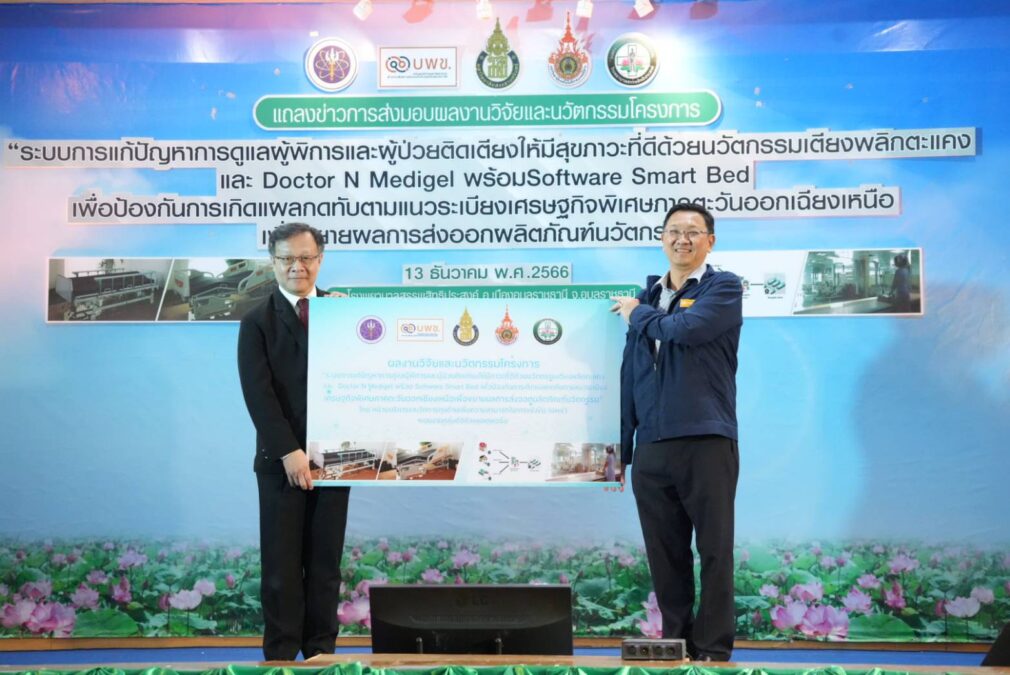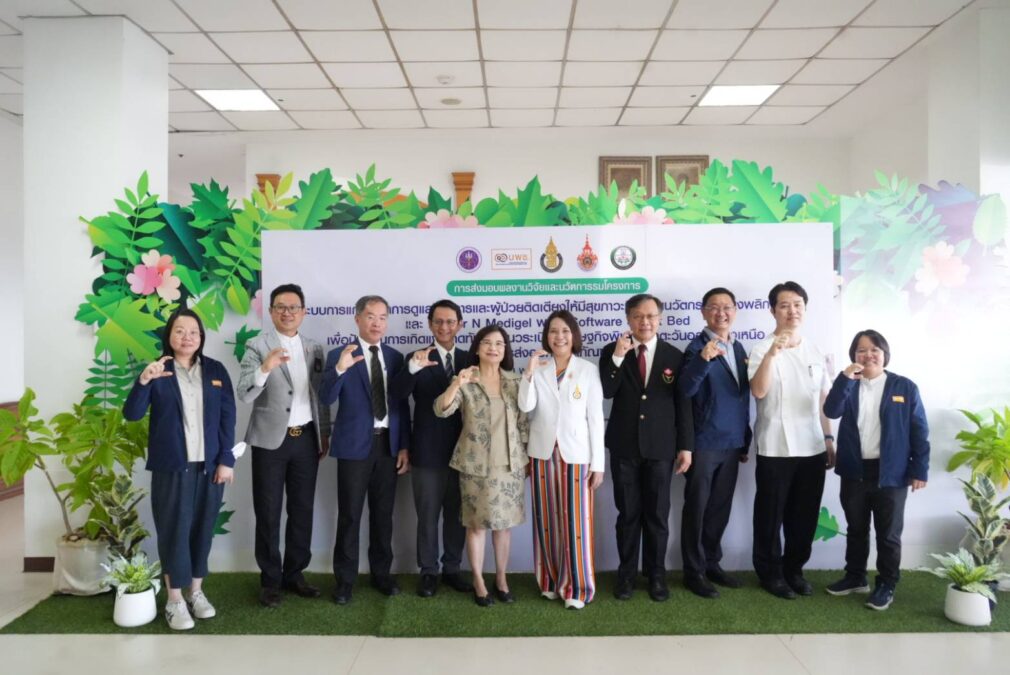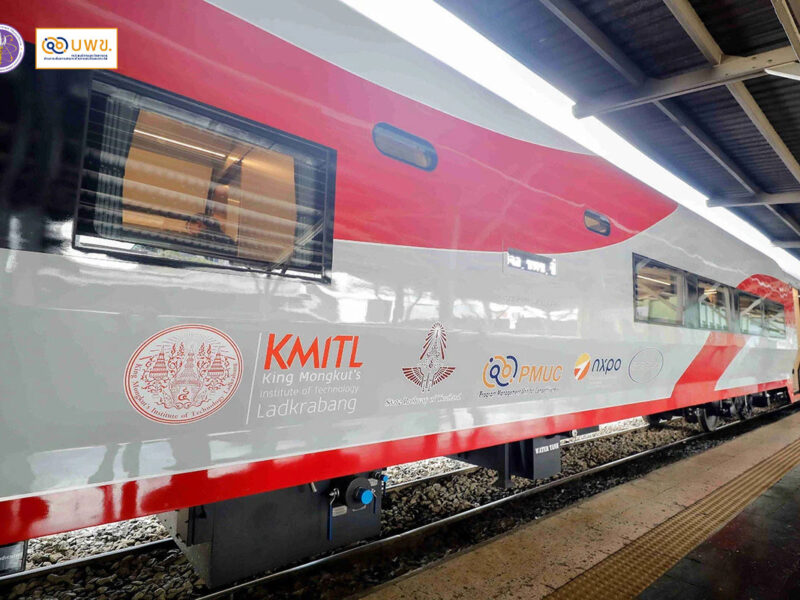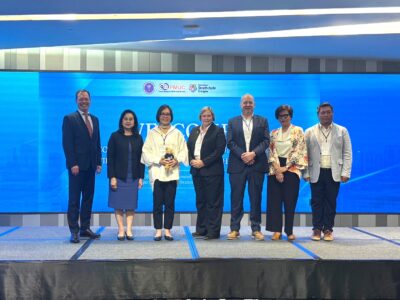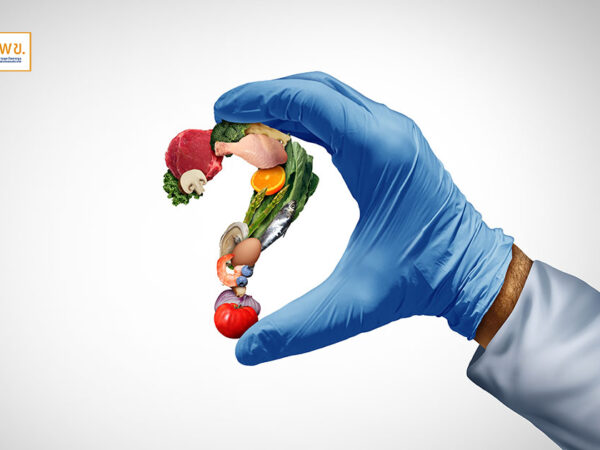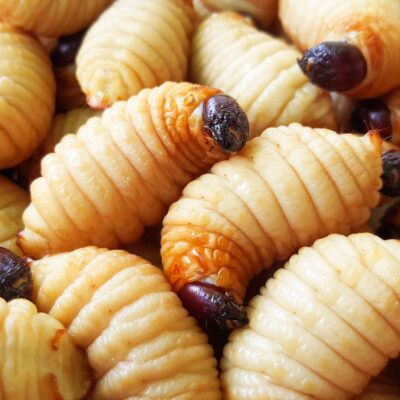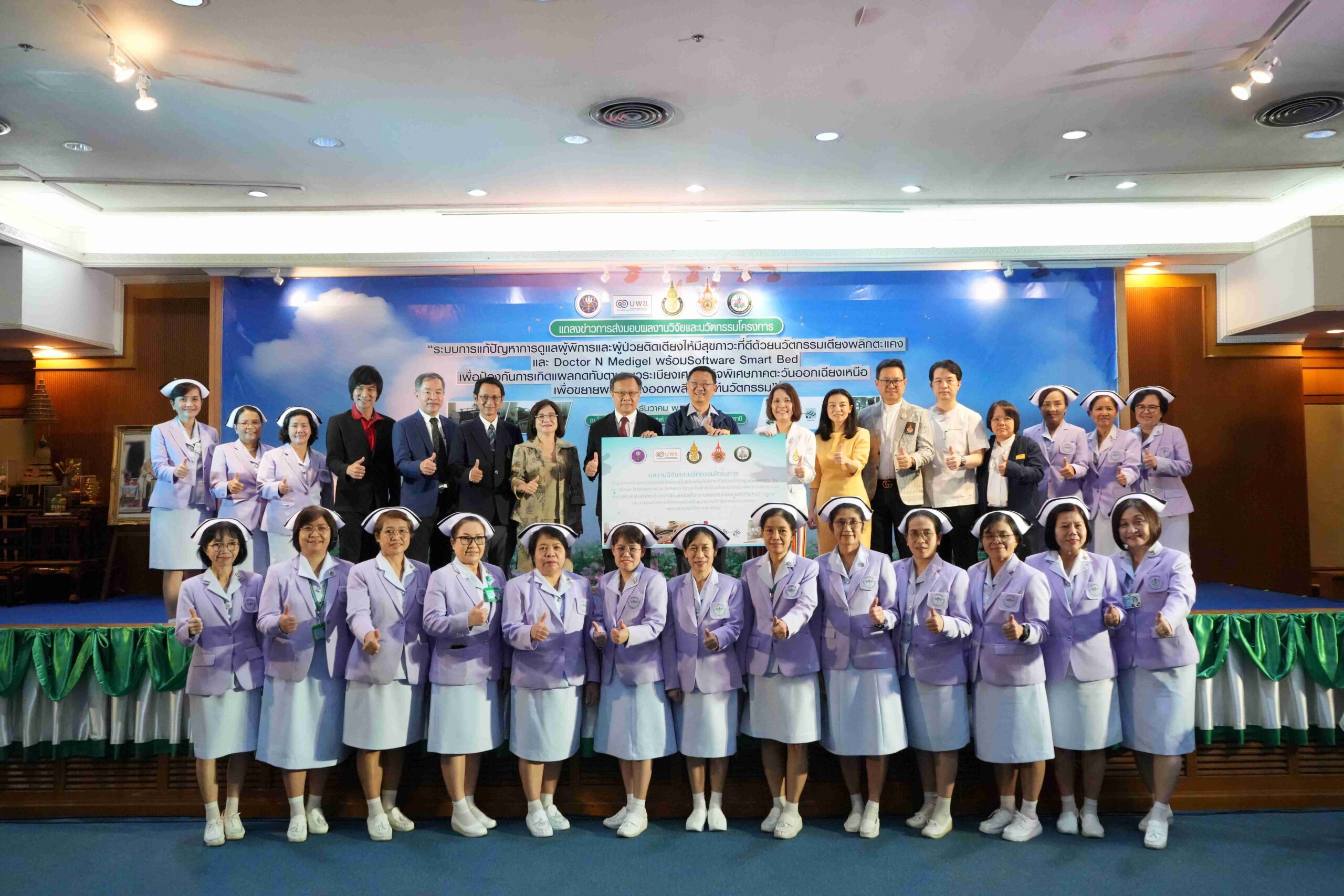
Program Management Unit for Competitiveness (PMUC), under the Ministry of Higher Education, Science, Research and Innovation (MHESI), in collaboration with Prince of Songkla University (PSU), held a press conference to deliver research results. These included “adjustable beds with Doctor N Medigel mattresses and automated software, along with Central Control systems” to Sappasithiprasong Hospital in Mueang Ubon Ratchathani District, Ubon Ratchathani Province. This initiative aims to address the care of disabled and bedridden patients to ensure their well-being and prevent pressure sores. The project is being piloted in the Northeastern Economic Corridor with the goal of expanding the export of Thai innovative products. Assoc. Prof. Thongchai Suwannasichon, Ph.D., Director of PMUC, presided over the handover of the research results to Dr. Monchai Wiwatanasithipong, Director of Sappasithiprasong Hospital. The event was also attended by Dr. Wilaiporn Jetanajan, Ph.D., PMUC Executive Committee member; Asst. Prof. Wannarat Santiamornthat, Ph.D., Chairman of the Digital Platform Subcommittee, PMUC; Assoc. Prof. Dr. Nalinee Kowitwanawong, Head of the Research Project; Assoc. Prof. Thanit Chalermyanont, Ph.D., Vice President of PSU; Asst. Prof. Sitthichok Anantaseree, Deputy Dean of the Faculty of Medicine, PSU; along with the research team and private sector representatives.
In an era where our world is transitioning into an aging society, the number of bedridden patients and those at risk of developing pressure sores has increased accordingly. This has resulted in a high and continuously growing market value for pressure sore prevention products each year. According to market data from 2012, the market value of pressure sore prevention support materials was as high as 2.9 billion USD, and in 2019, it increased to 4.1 billion USD. A report from the World Health Organization predicts that the number of elderly patients will increase by 1.5 million people per year, indicating an increasing market trend. Thus, just 1% of the market share is already of immense value. Recognizing the opportunity to improve the health and well-being of disabled and bedridden patients, research teams from Prince of Songkla University (PSU) and Rajamongkol University of Technology Isan (RMUTI) have developed an innovative turning bed and Doctor N Medigel with Smart Bed Software to prevent pressure sores. Their goal is to expand the market internationally and reduce the import of foreign technology. They have collaborated with NF Healthcare Co., Ltd. to develop a comprehensive patient care solution by integrating IoT and camera systems into the existing bed system, and have enhanced the Smart Bed Software to be innovative and distinct from other automated systems in the market. This project is supported by the 2022 research fund from the Program Management Unit for Competitiveness (PMUC) under the digital platform plan to enhance research and innovation efficiency in caring for disabled and bedridden patients, as well as to commercialize the innovation.
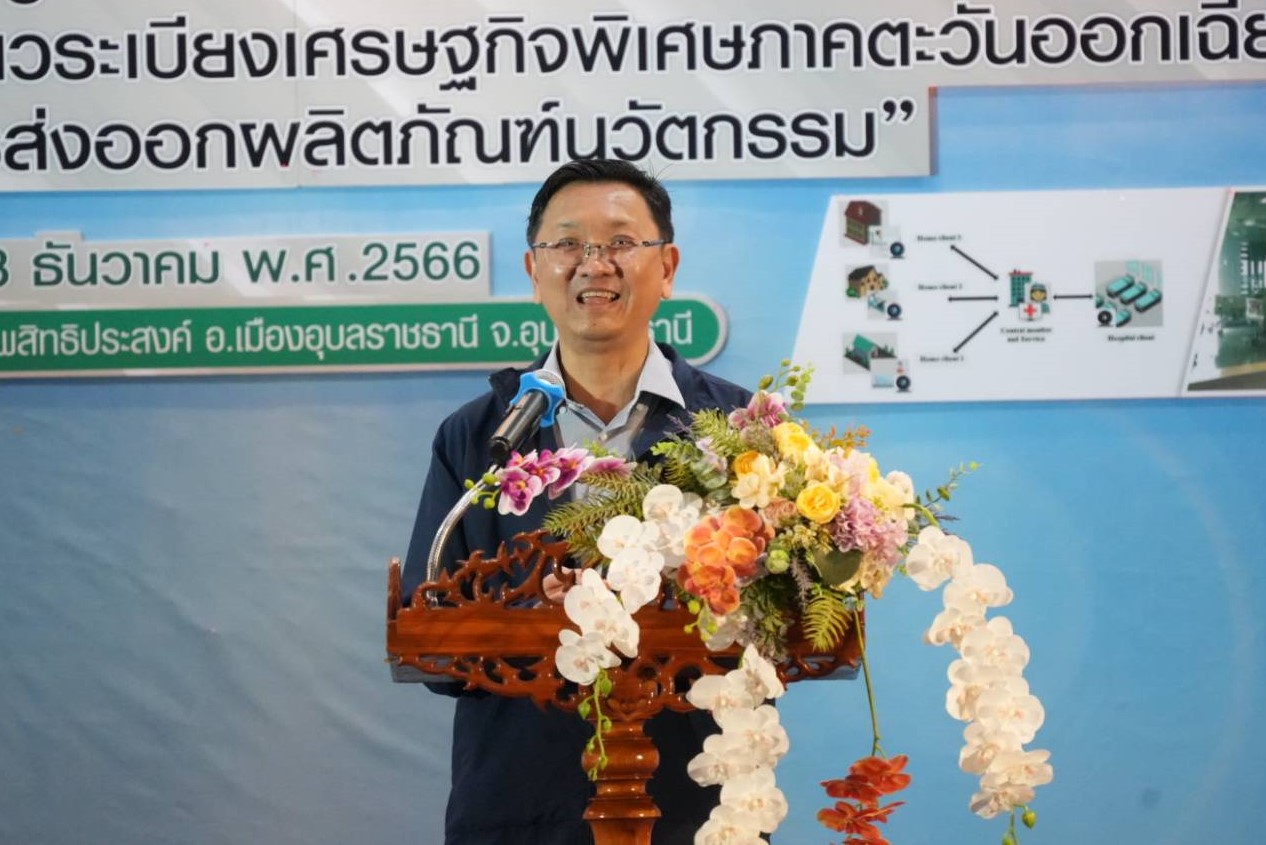
Associate Professor Thongchai Suwansichon, Ph.D., Director of PMUC, stated, “This innovation builds upon previous work funded by the National Research Council of Thailand (NRCT) and Thailand Science Research and Innovation Fund (TSRI) under MHESI, in collaboration with Assistant Professor Nalinee Kowitvanawong, Ph.D., from PSU and Associate Professor Sakravee Raweekul, Ph.D., from RMUTI. The Smart Bed Software for turning beds and Doctor N Medigel has been implemented in several elderly care facilities and hospitals, especially during the COVID-19 pandemic, and has received positive feedback. Therefore, the Digital Platform program at PMUC continues to support the development of Thai products to enhance their efficiency by integrating IoT and developing automated patient care systems. This will reduce the burden on medical personnel, decrease the import of foreign technology, and make the prices more accessible. This provides an option for Thais and medical service providers. Additionally, it promotes the potential of the private sector, including NF Healthcare Co., Ltd. and Bangkok Medical Equipment Co., Ltd., to commercialize the innovation and compete in the healthcare and medical fields in the ASEAN region in the future.”
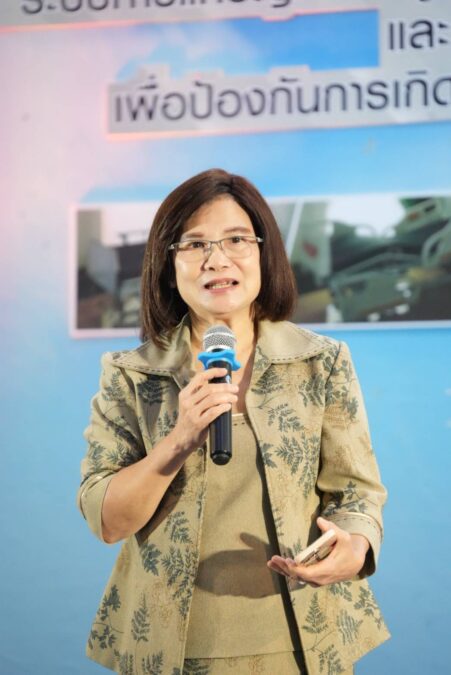
Dr. Wilaiporn Jetanajan, Ph.D., Executive Director PMUC, added, “We are very pleased with today’s delivery of research results. This innovation, created by Thais using materials sourced from Thai agricultural products, not only helps improve the quality of life for patients but also increases the value of Thai rubber by transforming it into high-value medical products. We would like to thank the research teams from PSU and RMUTI, as well as the private sector, for collaborating on developing this innovation to meet international standards and making it available to the public. Special thanks also go to Sappasitthiprasong Hospital for supporting the development of Thai researchers’ innovations by using these innovations in the hospital. Sappasitthiprasong Hospital is a large center in the northeastern region along the economic corridor, where many foreign nationals from the Mekong River Basin area come for services. This helps raise awareness about the tools used to care for patients in preventing pressure ulcers and broadens the recognition of research and innovation products among investors and distributors both domestically and internationally.”
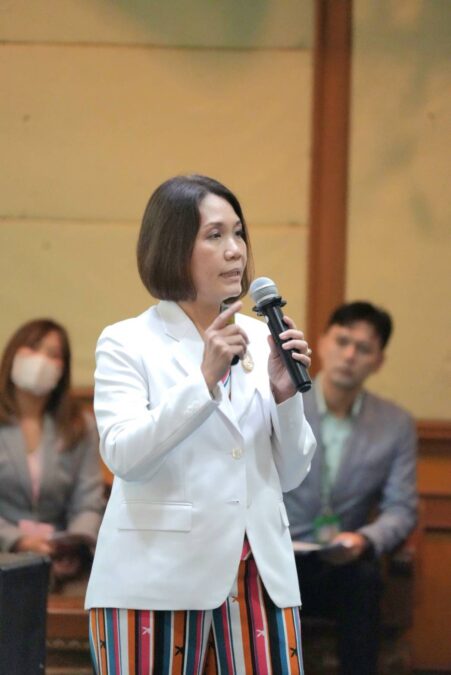
Asst. Prof. Nalinee Kowitwanawong, Ph.D., head of the research project, said about the project’s concept and goals, “The innovation of the turning bed and Doctor N Medigel mattress came from efforts to solve the problem of pressure ulcers in patients. We aim to add value to Thailand’s economic crop, rubber, by transforming it into medical devices. Through continuous research and development, we have successfully passed testing and achieved international medical standards. From our target group experiments, we received positive feedback, showing our competitiveness with similar imported products. Our goal is to enhance competitive potential and expand into international markets. Our research found that treating a single patient with pressure ulcers can cost up to 60,000 to 70,000 baht, as patients need to stay in the hospital for a long time, requiring 2-4 medical personnel to turn them every two hours. This is a heavy burden on medical staff who care for many patients. Therefore, we have been trying to find ways to reduce this burden, alleviate patients’ pain, and allow relatives to monitor remotely. With funding from PMUC, we have developed additional technology, including Sensor Processing systems and camera detection systems, to process and adjust patient care appropriately. Information is sent to a center at the hospital, allowing doctors to monitor patients remotely. Additionally, a mobile app for relatives allows them to control patient turning from their workplace. This innovation is ready for technology transfer, production, and sale by private entities. Our main domestic target customers are public and private hospitals, which are continually expanding. Our research team plans to enter the highly competitive international market with different marketing strategies from those used domestically. Expanding into the northeastern region along the economic corridor, with its borders adjacent to Mekong Basin countries, facilitates this goal.”
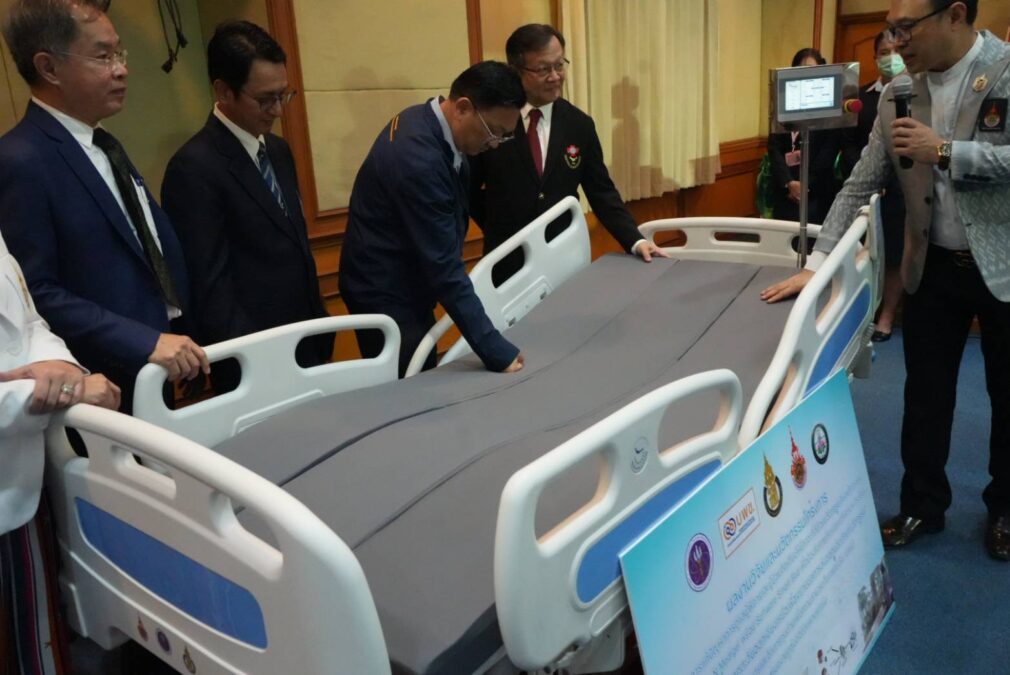
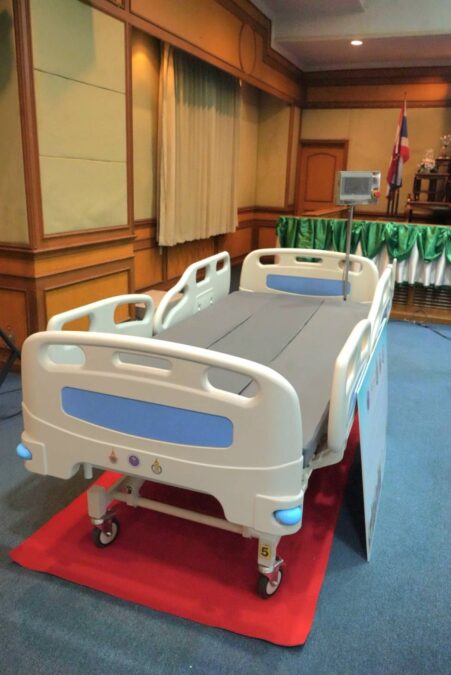
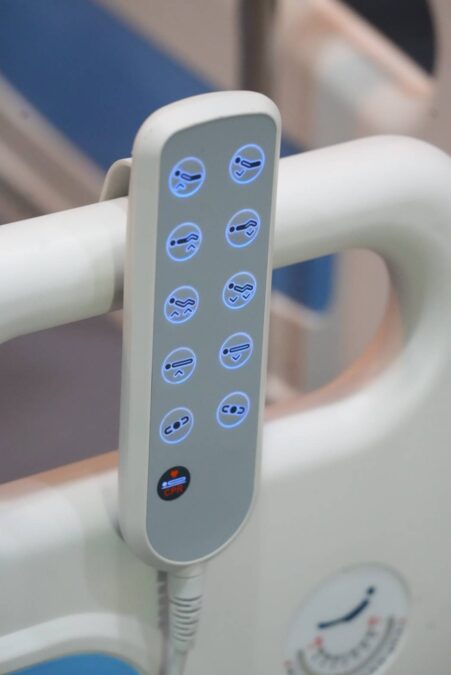
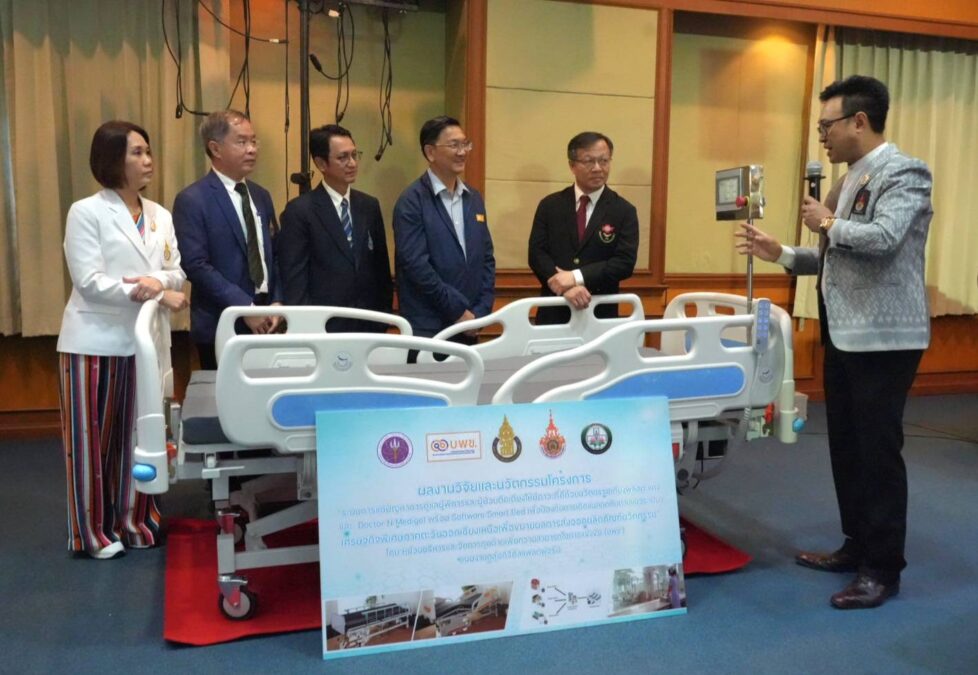
The standout feature of the bed developed by the research team is the Electric Flipping Bed with Doctor N Medigel Mattress. The bed frame is constructed from square steel tubes and the bed surface is divided into four sections: head, back, hip, and legs, with overall dimensions of 100 x 220 cm. Every piece of steel is powder-coated to prevent rust. The research team installed four electric motors for various functions: adjusting the head of the bed from 0-75 degrees, adjusting the knee bend from 0-45 degrees, adjusting the bed height from 50-75 cm, and flipping the body to the left or right by approximately 30 degrees. The bed is equipped with high-quality 5-inch castors, each with brakes. The bed’s headboard is made from injection-molded ABS plastic and features various types of railings, such as injection-molded ABS plastic, aluminum, and stainless steel. Additionally, the bed can be adjusted to a maximum height of 78 cm and a minimum height of 48 cm, not including the mattress thickness. The bed can support a maximum patient weight of up to 120 kg.
As for the Doctor N Medigel, it is a latex gel that prevents pressure ulcers and is classified as a Class I medical device. The manufacturing company has registered its manufacturing and storage facility with the Food and Drug Administration (FDA). The gel has passed cytotoxicity tests, irritation tests, and allergy tests from internationally certified laboratories and is certified with ISO 13485 quality management system for medical devices, ensuring its safety for patient use. The software used to control the bed, along with its controller, has passed safety tests under IEC 62304 Medical Device Software, Software Life-cycle Processes, and IEC 60601-1 Medical Electrical Equipment Part 1: General Requirements for Basic Safety and Essential Performance from NECTEC NSTDA. Moreover, the research team has received patents for pressure-relieving materials for supporting patients’ bodies during surgery, made from polymer-coated latex and the production process of these materials, as well as a utility model patent for the bed designed to prevent pressure ulcers.
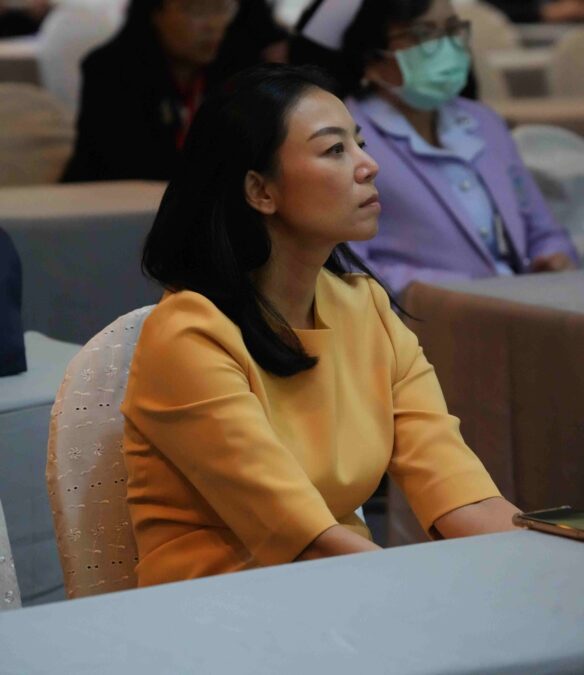
Ms. Marita Rukkapanmethee, Managing Director of Bangkok Medical Equipment Company Limited, revealed the company’s commercial innovation plan, saying, “Previously, the company was involved in producing regular hospital beds, but these beds lacked the function of tilting to relieve pressure sores. We anticipate that the elderly population will increase in the future. If we can address this pain point, we can expand our market. This round of funding has enabled us to enhance our manufacturing technology, and our employees have learned how to use new technologies. This allows SME entrepreneurs like us to produce and export internationally standardized innovative hospital beds. Currently, we have entered the markets of home use and nursing homes, which differ from hospitals in that hospitals prioritize functionality over appearance. However, for home use, we need to hire designers to ensure that the beds do not resemble hospital beds. We have already started selling these products in the market and are planning to implement a business model of selling life-care packages. If the products expire or deteriorate, we will buy them back and replace them. Our beds are priced around 100,000 baht, which is cheaper than beds imported from Europe, which cost around 300,000 to 400,000 baht per bed. We are proud to be the first in Asia to produce internationally standardized hospital beds with tilting functions for pressure sore management.”
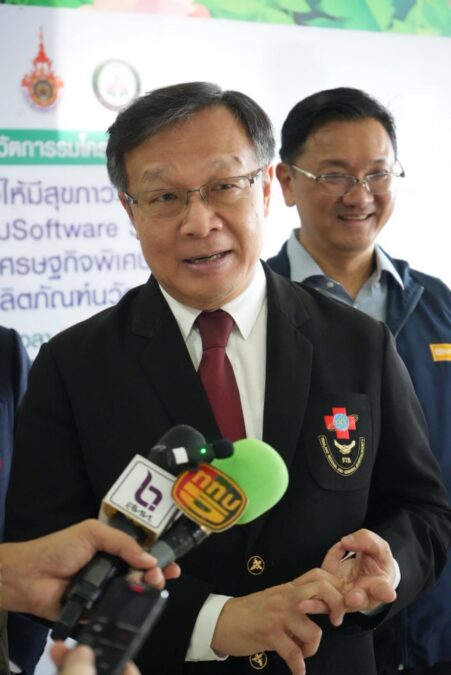
Dr. Montchai Wiwatthanasittipong, Director of Sappasitthiprasong Hospital, added, “In a single day, hospitals receive between 3,000 to 4,000 patients, including approximately 30-40 bedridden patients and ICU patients. Each bedridden patient requires about 3-4 staff to help them turn over every 2 hours, which imposes a heavy burden on hospital staff, including caregivers. Therefore, in reality, we need to rely on technology to reduce pressure sores, streamline work processes, and alleviate the workload of hospital staff who care for a large number of patients. The system and products developed by Thai researchers this time are a significant step forward in promoting Thai medical technology and innovation to international standards, enabling competitiveness in the global market. This will sustainably drive the competitiveness of the Thai medical industry towards the goals set by PMUC.”

